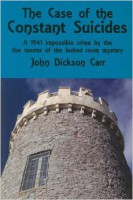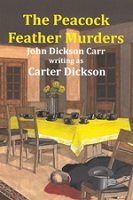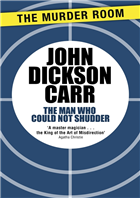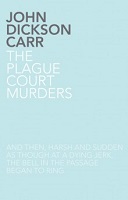- Comment
-
Subscribe
Subscribed
Already have a WordPress.com account? Log in now.
 The Case of the Constant Suicides (1941) Hey, you; yes, you, with the cup of tea. I want you to write a book about people inexplicably hurling themselves out of a window when sleeping alone in a room at the top of a tower. I want it to be creepy, I want it to be fast-moving, I want it to have an undertone of threat; it also has to be fairly-clued, the culprit resonsible must be a complete surprise and you can kill as many characters as you like. Oh, and make it funny. Make it laugh out loud, technicolour funny, but light enough to take up residence in your brain without leaving so much as a shadow and without undoing the threat mentioned above. What’s that? It’s already been done? Oh, forget it, then I’ll just read that book instead. [Available from Rue Morgue Press in print only, the recommended version as some other publishers inexplicably and unforgivably give away key points in their cover art]
The Case of the Constant Suicides (1941) Hey, you; yes, you, with the cup of tea. I want you to write a book about people inexplicably hurling themselves out of a window when sleeping alone in a room at the top of a tower. I want it to be creepy, I want it to be fast-moving, I want it to have an undertone of threat; it also has to be fairly-clued, the culprit resonsible must be a complete surprise and you can kill as many characters as you like. Oh, and make it funny. Make it laugh out loud, technicolour funny, but light enough to take up residence in your brain without leaving so much as a shadow and without undoing the threat mentioned above. What’s that? It’s already been done? Oh, forget it, then I’ll just read that book instead. [Available from Rue Morgue Press in print only, the recommended version as some other publishers inexplicably and unforgivably give away key points in their cover art] The Peacock Feather Murders [a.k.a The Ten Teacups] (1937) [as Carter Dickson] Some crimes are created impossible, some achieve impossibility, and others have their impossibilities thrust upon them. Decide for yourself which applies here as a man is shot twice in the back – burn marks from the gun on the back of his head and everything – having been observed going into an empty room and witnesses at both exits saw no-one else enter or leave. A superb introduction to Carr’s other regular sleuth, Henry ‘H.M.’ Merrivale, who featured in many of his books published under the nom de plume Carter Dickson. Good to get in early so that you appreciate how a series of events can have two different origins (don’t worry, no spoilers). One of my all-time favourite sealed room murders, constructed so loosely as to admit almost anything (for example, a secret society laying out a tableful of teacups in advance of each murder – surely one of Carr’s most gloriously batty setups) and yet so tightly that you can’t slide a fag paper between the intention and the execution. [Available from Rue Morgue Press in print only]
The Peacock Feather Murders [a.k.a The Ten Teacups] (1937) [as Carter Dickson] Some crimes are created impossible, some achieve impossibility, and others have their impossibilities thrust upon them. Decide for yourself which applies here as a man is shot twice in the back – burn marks from the gun on the back of his head and everything – having been observed going into an empty room and witnesses at both exits saw no-one else enter or leave. A superb introduction to Carr’s other regular sleuth, Henry ‘H.M.’ Merrivale, who featured in many of his books published under the nom de plume Carter Dickson. Good to get in early so that you appreciate how a series of events can have two different origins (don’t worry, no spoilers). One of my all-time favourite sealed room murders, constructed so loosely as to admit almost anything (for example, a secret society laying out a tableful of teacups in advance of each murder – surely one of Carr’s most gloriously batty setups) and yet so tightly that you can’t slide a fag paper between the intention and the execution. [Available from Rue Morgue Press in print only] The Man Who Could Not Shudder (1940) You own a haunted house, and so of course you throw a weekend gathering. Your return is an inexplicable shooting, a second death whose explanation contains as perfect a facet of human nature as will be encountered in detective fiction, and Gideon Fell on site to grumble, barrel and grouse his way through the maze. Technically the prequel to …Constant Suicides, and there’s one minor element of this given away in that, but it’s worth it for the picture of Fell it enables you to draw at that first encounter. The final revelation is utterly audacious – truly the kind of development that would put you off a lesser talent, but here it charmed me so much that I immediately signed up for everything else Carr had ever written. [Available from Orion in print and ebook]
The Man Who Could Not Shudder (1940) You own a haunted house, and so of course you throw a weekend gathering. Your return is an inexplicable shooting, a second death whose explanation contains as perfect a facet of human nature as will be encountered in detective fiction, and Gideon Fell on site to grumble, barrel and grouse his way through the maze. Technically the prequel to …Constant Suicides, and there’s one minor element of this given away in that, but it’s worth it for the picture of Fell it enables you to draw at that first encounter. The final revelation is utterly audacious – truly the kind of development that would put you off a lesser talent, but here it charmed me so much that I immediately signed up for everything else Carr had ever written. [Available from Orion in print and ebook] The Plague Court Murders (1934) [as Carter Dickson] The first outing for H.M., who at this stage isn’t terribly different from Fell, but the puzzle of a psychic attacked and stabbed in the back while alone in a stone hut locked from the outside, barred on the inside and surrounded by unmarked mud is probably one of the singlemost atmospheric things Carr ever wrote…which, frankly, is saying something. The first half groans so loudly with menace that you almost can’t hear yourself think, the puzzle is the kind of absolute head-thumper that this genre should provide, the bloody historical background informs without ever intruding…this is the point in his career where Carr really started to fly. It’s also good to see H.M. as a stern ratiocinator rather than the figure of fun he would later become, good as Carr’s comical writing was. [Available from Langtail Press in print and ebook]
The Plague Court Murders (1934) [as Carter Dickson] The first outing for H.M., who at this stage isn’t terribly different from Fell, but the puzzle of a psychic attacked and stabbed in the back while alone in a stone hut locked from the outside, barred on the inside and surrounded by unmarked mud is probably one of the singlemost atmospheric things Carr ever wrote…which, frankly, is saying something. The first half groans so loudly with menace that you almost can’t hear yourself think, the puzzle is the kind of absolute head-thumper that this genre should provide, the bloody historical background informs without ever intruding…this is the point in his career where Carr really started to fly. It’s also good to see H.M. as a stern ratiocinator rather than the figure of fun he would later become, good as Carr’s comical writing was. [Available from Langtail Press in print and ebook] The Hollow Man [a.k.a The Three Coffins] (1935) And now, my friend, now you’re ready to discover how Charles Grimaud’s killer could disappear from a locked third-storey room and vanish without a trace over snowy ground; how he could then soon after kill a second man in the middle of a snow-covered street without leaving any sign of his presence besides the dead body. Sure, you could just start here – autumn is upon us, and it’s probably the perfect book for chilly evenings when a rising gloom presses against your windows – but the context of at least some of the above will help with the game Carr has pulled you into without your realising it. [Available from Orion in print and ebook]
The Hollow Man [a.k.a The Three Coffins] (1935) And now, my friend, now you’re ready to discover how Charles Grimaud’s killer could disappear from a locked third-storey room and vanish without a trace over snowy ground; how he could then soon after kill a second man in the middle of a snow-covered street without leaving any sign of his presence besides the dead body. Sure, you could just start here – autumn is upon us, and it’s probably the perfect book for chilly evenings when a rising gloom presses against your windows – but the context of at least some of the above will help with the game Carr has pulled you into without your realising it. [Available from Orion in print and ebook]
Very nicely done JJ, there are all marvellously entertaining 🙂 Not going to disagree with any of the these in fact, but I look forward to THE JUDAS WINDOW, HE WHO WHISPERS, SHE DIED A LADY and HE WOULDN;T KILL PATIENCE and many more being added in the future!
LikeLike
Still can’t track down a copy of …Patience, but the others and more will be coming. Just need to work out how, since there’s also so much more to write about. Dammit, why did no-one warn me about how difficult blogging is?
LikeLike
Can;t wait for those review – what fun! There are reasonably priced copies of PATIENCE available through ABEBOOKS: http://www.abebooks.co.uk/book-search/title/he-wouldn't-kill-patience/
LikeLike
Oh, look at you lovely people giving me all these chance to buy yet more books. Must….resist……must…..stay…..strong……and……..reduce……TBR…..pile……
LikeLike
Well in a rare sci fi moment all I can say is ‘Resistance is Useless’ (Hitchhiker’s Guide).
LikeLiked by 1 person
They all sound really good. I’ll have to look out for them in my next book hunt.
LikeLike
Good hunting; any Carr you can find is worth buying, mainly because you can’t currently guarantee that you’ll ever find it again. I have friends on three continents looking for me, as it seems the only way I’m going to track everything down without bankrupting myself.
LikeLike
Sounds like a very extensive operation you’ve got going on there. I have to mostly rely on Amazon and Ebay annoyingly to get my more rarer titles, as I don’t live near to any decent second hand book shop. As to that …Patience book you’re after there is actually a copy on Amazon.co.uk reasonably priced (well by rare book standards anyways)
http://www.amazon.co.uk/Wouldnt-Kill-Patience-Carter-Dickson/dp/B000V8G9GA/ref=sr_1_1?s=books&ie=UTF8&qid=1443297392&sr=1-1&keywords=HE+WOULDN%3BT+KILL+PATIENCE
LikeLike
I’m always amazed as to how virtually every other reviewer’s list of recommended Carr novels introduces a title I have yet to hear of. And in your case I’ve heard, for the first time, of ‘Death Watch’ and ‘The Man Who Could Not Shudder’.
I confess that my first forays into Carr fell short of converting me into a fan; in contrast, the first few novels by Ellery Queen hooked me in quite quickly. Perhaps it took some time for me to appreciate Merrivale’s and Fell’s quirks. I enjoyed the mystery for ‘The Problem of the Green Capsule’, but found one or two scenes towards the end overly-dramatic; I thought less of the mystery for ‘The Plague Court Murders’, and found more than one or two scenes overly-dramatic. But things seem to be taking a better turn between Carr and I with ‘She Died a Lady’ and ‘Till Death to Us Part’. 🙂
LikeLike
Yeah, everyone will be able to suggest a different Carr, especially with so many to choose from. An overburdening of drama does tend to feature in his earlier stuff – aspects of The Plague Court Murders I won’t contest, and much from from the same period as well (e.g. The White Priory Murders) – but after a while either you stop noticing it or he just got better at working it in. Not really sure which. …Suicides and …Shudder certainly aren’t thus affected, anyway, so they’re good places to go to if you wish to avoid it.
LikeLike
If I recall correctly, the Carr novel I read after ‘Plague Court’ was ‘Judas Window’, which I felt to be much better managed in terms of its dramatic qualities. Though contrary to quite a few reviews I’ve read, I wasn’t especially impressed by the mystery plot. But it was sufficiently enjoyable to encourage me to embark upon three more titles: ‘Emperor’s Snuff-Box’, ‘She Died a Lady’ and ‘Till Death Do Us Part’. ‘Emperor’s Snuff-Box’ and ‘Till Death Do Us Part’ were both quite intense, but the drama gelled well with the substance of the story.
‘He Who Whispers’ and ‘Hollow Man’ are still sitting on the shelf awaiting to be read; based on your reviews, I would be tempted to try out ‘Constant Suicides’ and ‘Death Watch’ as well. Thanks for your recommendations! 🙂
LikeLike
I too am not as big a fan of the locked room in Judas Window as others seem to be, but overall I think it’s a very, very good book and there is one particular element that I absolutely adore (which may have to wait for the review that is swiftly becoming more and more inevitable).
LikeLike
Pingback: The Case of the Constant Suicides (1941) by John Dickson Carr: An ‘ingenious and… baffling… series of crime’ | crossexaminingcrime
Pingback: Rating John Dickson Carr – The Classics – The Green Capsule
Pingback: Rating John Dickson Carr – Highly Recommended – The Green Capsule
Pingback: #166: One week until #Carr110 – Some Links to Help You… | The Invisible Event
Pingback: The Man Who Could Not Shudder by John Dickson Carr – Mysteries Ahoy!